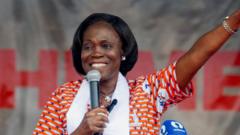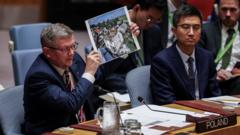Could the Iron Lady Become Ivory Coast's Next President?

Published: 2025-09-13 01:36:22 | Category: world
Simone Gbagbo, the former First Lady of Ivory Coast, has emerged from years of political obscurity to announce her candidacy for the presidency in October’s elections. Once hiding in a bunker to avoid arrest, the controversial figure is now rallying support to "build a new nation." Her run is significant, marking a notable shift in a political landscape where women are severely underrepresented.
Last updated: 26 October 2023 (BST)
Key Takeaways
- Simone Gbagbo is running for president after years of political turmoil.
- She is the founder of the Movement of Capable Generations (MGC).
- Gbagbo's candidacy highlights the underrepresentation of women in Ivorian politics.
- She aims to modernise and improve the socio-economic conditions in Ivory Coast.
- Her political history is marked by significant controversies and a criminal conviction.
The Political Resurrection of Simone Gbagbo
Simone Gbagbo's journey from hiding to the political forefront is remarkable. She was once feared as the "iron lady" during her husband Laurent Gbagbo's presidency, a time characterised by authoritarian rule and civil unrest. Now, at the age of 76, she stands poised to challenge the current president, Alassane Ouattara. Gbagbo’s return to politics is not just about reclaiming power; it is also a statement about resilience and the evolving role of women in Ivorian politics.
Background and Early Activism
Simone met Laurent Gbagbo in 1973 when both were influential in the trade union movement. They became prominent figures in the fight against the autocratic regime of President Félix Houphouët-Boigny. Their activism often led to imprisonment, highlighting their commitment to political change. Gbagbo's educational background, including degrees in history and linguistics, provided her with the tools to advocate for democracy.
The Gbagbos' Political Partnership
In 1982, the couple co-founded the Ivorian Popular Front (FPI), which played a crucial role in the push for multi-party democracy. While Laurent was seen as the charismatic leader, Simone was regarded as the driving force behind the scenes. Their partnership was instrumental during the 1990 elections, where Laurent secured a seat in the National Assembly. However, the Ivorian political landscape was fraught with challenges, including allegations of electoral fraud and political repression.
The Rise and Fall of Laurent Gbagbo
Laurent Gbagbo finally won the presidency in 2000, but his tenure was marred by increasing authoritarianism. His policies, particularly the concept of Ivoirité, deepened divisions within the country, leading to civil conflict. The presidential elections scheduled for 2005 were postponed multiple times, and when he lost to Ouattara in 2010, he refused to step down, leading to a brutal civil war that claimed thousands of lives.
Simone Gbagbo's Legal Troubles
Following the civil unrest, both Gbagbos faced serious legal challenges. Simone was convicted in 2018 for "attempting to undermine the security of the state," receiving a 20-year sentence. However, she was granted amnesty in 2021, allowing her to participate in the upcoming elections. The International Criminal Court had also pursued charges against her, but these were eventually dropped, reinforcing the perception that the legal battles were politically motivated.
A New Political Era?
After her amnesty, Gbagbo has been actively rebuilding her political presence. She founded the Movement of Capable Generations (MGC) to further her vision for a "modernised" Ivory Coast. This new party aims to address the socio-economic challenges facing the nation, with a focus on creating opportunities for all Ivorians, especially women.
Symbolism of Her Candidacy
Simone Gbagbo's return to the political arena is significant not only for its implications for the Ivorian political landscape but also for women’s representation in governance. With only 30% of Ivorian parliamentarians being women, Gbagbo’s candidacy is a call to action for female empowerment in a traditionally male-dominated sphere. Her potential election as the first female president of Ivory Coast would mark a historic moment in the nation’s political history.
The Current Political Climate
As the elections approach, the political atmosphere in Ivory Coast remains tense. Gbagbo's candidacy is seen as a formidable challenge to Ouattara, who has been in power since 2010. The dynamics of this election will be closely watched, especially given the backdrop of past civil conflicts and ongoing socio-political issues. Gbagbo's ability to unify her supporters and appeal to a broader electorate will be crucial in determining the election's outcome.
The Role of Media and Public Perception
Media portrayal will play a significant role in shaping public perception of Gbagbo’s candidacy. While some view her as a symbol of resilience and a champion for democracy, others remember the controversies of her past. Gbagbo's adeptness at communication and her experience in rallying support will be tested as she navigates the complex terrain of Ivorian politics.
What Lies Ahead?
As the election date nears, Gbagbo's campaign promises of a "prosperous" Ivory Coast resonate with many citizens yearning for change. Her history of activism and her plans for governance may attract voters looking for a different direction from Ouattara's administration. However, the path forward will require careful navigation of the country's political landscape, which remains volatile.
The upcoming elections will not only be a referendum on Gbagbo’s political legacy but also a litmus test for the future of governance in Ivory Coast. With her past experiences and the current socio-political context, Gbagbo's candidacy may either usher in a new era or reinforce existing power structures. The question remains: can the "iron lady" secure her place in history as Ivory Coast's first female president?
FAQs
What led to Simone Gbagbo's initial political prominence?
Simone Gbagbo gained prominence as the First Lady during her husband Laurent's presidency and was influential in their joint political activism against the previous regime, advocating for democracy and social justice.
Why was Simone Gbagbo imprisoned?
She was convicted for attempting to undermine the security of the state and for her role during the civil war, receiving a 20-year sentence, which was later commuted through amnesty.
What is the Movement of Capable Generations (MGC)?
The MGC is a political party founded by Simone Gbagbo aimed at addressing socio-economic issues in Ivory Coast and promoting women's representation in politics.
What are Gbagbo's main campaign promises?
Her campaign focuses on modernising Ivory Coast and improving living conditions, with a strong emphasis on unity, democracy, and economic prosperity.
How significant is Gbagbo's candidacy for women in politics?
Her candidacy is crucial as it highlights the need for greater female representation in Ivorian politics, serving as an inspiration for women to engage in leadership roles.



